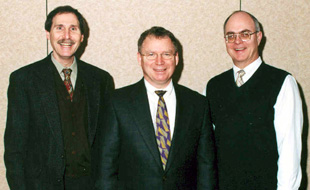 |
Carl Camras, M.D., Robert Troia, M.D., and James Armitage, M.D. |
To say Robert Troia, M.D., enjoys being a mentor to ophthalmology residents is an understatement. In fact, the 10 hours he devotes each week as a volunteer faculty member are the professional highlight of his week.
“The time I spend with residents is the best time of my week,” said Dr. Troia, whose volunteer faculty service dates back to 1985, when he entered private practice at Omaha’s Pediatric Ophthalmology Associates.
“When I returned to Omaha, obviously the residency program at the university was a logical place to stay involved with academics and to help residents,” Dr. Troia said. “Physicians should take every opportunity to help residents become exposed to situations which will arise in surgical or clinical settings so that, when they complete their residency, they will feel comfortable treating their own patients.”
Many physicians who donate their time to assist residents share Dr. Troia’s philosophy regarding the Volunteer Faculty Program. But few might admit their involvement with the program is the part of their week they most look forward to. In honor of Dr. Troia’s commitment to the program, he received the December Volunteer Faculty of the Month Award from the UNMC College of Medicine.
“I was honored (to receive the award) and it really was totally unexpected,” Dr. Troia said. “I know there are many people who are more deserving than I am, but I still appreciate the honor. I look forward to a continued relationship with the university.”
Dr. Troia, whose father and brother also are ophthalmologists, received his undergraduate degree from the University of Notre Dame in 1975 before earning his medical degree from Creighton University in 1979. He then took part in specialized training at Southern Nevada Memorial Hospital (1979-80) and at the University of Missouri at Kansas City (1980-83) and served fellowships at Willis Eye Hospital (1983-84) and the Smith-Ketterwell Institute for Visual Sciences before entering private practice.
Not only does Dr. Troia enjoy being a mentor and a teacher to the residents, he also gains new knowledge and insights in ophthalmology by being involved with the young physicians.
“Obviously, the residents are full of questions and it helps me to stay up-to-date in terms of knowledge and techniques in pediatric ophthalmology,” he said. “So it’s kind of a win-win situation — I can help them out and they can help me out — and it does stimulate me to stay current.”
His enjoyment also stems from keeping in touch with some of his former residents. “There are quite a few who have come through the program who are now in private practice, not only in Nebraska, but all across the country. They’ll call back every once in a while to touch base on a patient they might need some advice on.”
As for the best advice he could offer? “I would always remind them to keep the patients’ interests first and treat them as if they are a family member.”